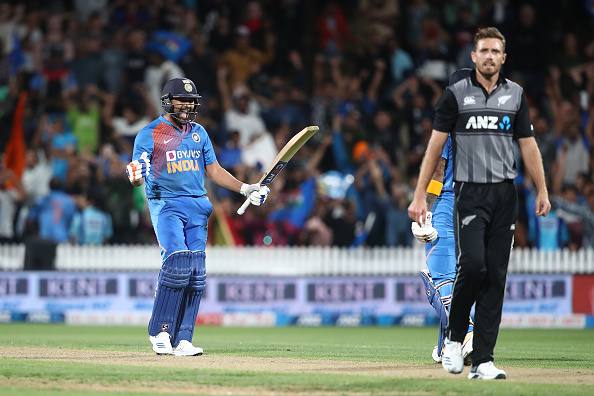
The International Cricket Council (ICC) on Monday (February 10) introduced new Super Over regulations to be used in the case of a tie in T20 International matches.
As per a report published in outlookindia.com, the rules will come into effect from the upcoming South Africa-England and South Africa-Australia series.
Procedure for the Super Over
The following procedure shall apply if the playing conditions provide for a Super Over to decide the winner of a tied match.
1. If the match is tied a Super Over is played. If the Super Over is a tie, then subsequent Super Overs shall be played until there is a winner. Unless exceptional circumstances arise, there shall be an unlimited number of Super Overs played to achieve a result. (see Clause 24 below).
2. The Super Over involves each team facing one over (unless all out earlier), and the winner shall be the team that scores the most runs from its one over innings.
3. The loss of two wickets in the over ends the team’s one over innings.
4. Each team shall be allowed to make one unsuccessful Player Review in each innings of the Super Over. This entitlement shall apply irrespective of the number of unsuccessful Player Review requests made during the match itself.
5. Subject to weather conditions the Super Over will take place on the scheduled day of the match at a time to be determined by the ICC Match Referee. In normal circumstances it shall commence 5 minutes after the conclusion of the match.
6. The Super Over will be played until completion, but if there are any delays or interruptions during the Super Over, Extra Time (taken from the start of the first Super Over) is allocated to complete the Super Over or any subsequent Super Overs. The amount of extra time allocated to the Super Over is the greater of;
(a) the gap between the time at which the match ended and the time the original match would have been scheduled to finish had the entire extra time provision been utilized, or
(b) 20 minutes.
Should play be delayed prior to or during the Super Over(s) once the playing time lost exceeds the Extra Time allocated, the Super Over(s) shall be abandoned.
1. The Super Over shall take place on the pitch allocated for the match (the designated pitch) unless otherwise determined by the umpires in consultation with the Ground Authority and the ICC Match Referee.
2. Only nominated players in the match (including activated concussion replacements) may participate in the Super Over. Should any player (including the batsmen and bowler) be unable to continue to participate in the Super Over due to injury, illness or other wholly acceptable reasons, the relevant Playing Conditions as they apply in the match shall also apply in the Super Over.
3. Any penalty time being served in the match shall be carried forward to the Super Over.
4. The umpires shall stand at the same end as that in which they finished the match.
5. The team batting second in the match shall bat first in the Super Over.
6. The captain of the fielding team (or his nominee) shall select the ball with which the fielding team shall bowl its over in the Super Over from the box of spare balls provided by the umpires (which shall include the balls used in the match, but no new balls). The team fielding first in the Super Over shall have first choice of ball. The team fielding second may choose to use the same ball as chosen by the team bowling first. If the ball needs to be changed, the Playing Conditions shall apply.
7. The fielding side shall choose the end from which it is to bowl its one over.
8. Each team’s over is played with the same fielding restrictions as apply for the last over in a match played under the ICC Twenty20 International Playing Conditions.
9. The winners of the Super Over shall be the team which scored the most runs as per normal playing conditions and irrespective of the number of wickets lost. (See also Clause 3 above).
TIED SUPER OVER - REPEATING THE SUPER OVER PROCEDURE
1. If the Super Over is tied, then subsequent Super Overs will be played until there is a winner.
2. In normal circumstances, any subsequent Super Over will start 5 minutes after the previous Super Over ends. The interval shall be 5 minutes.
3. The team batting second in the previous Super Over will bat first in the subsequent Super Over.
4. The balls selected for use by each team in the previous Super Over shall be used again by the same team in subsequent Super Overs.
5. The fielding side must bowl its over in a subsequent Super Over from the opposite end to which it bowled from in the previous Super Over.
6. Any batsman dismissed in any previous Super Over shall be ineligible to bat in the following Super Over.
7. The bowler who bowled the over in the previous Super Over shall be ineligible to bowl the over in the subsequent Super Over.
8. All other playing conditions will be the same as for the initial Super Over.
9. In circumstances where there are unavoidable time constraints, such as, but not limited to, double-header matches which do not allow the completion of multiple Super Over(s) the Home Board may, prior to the start of the series and by notification to the participating teams, limit the number of possible Super Overs.
EXAMPLES - EXTRA TIME AVAILABLE FOR THE SUPER OVER.
Example 1: The match is scheduled to finish at 10.20pm, with 60 minutes of extra time available to be used. The scheduled cut-off time if all the available extra time is used would be 11.20pm. The match runs over time and finishes in a tie at 10.35pm. The Super Over is scheduled to start 5 minutes later at 10.40pm. The extra time available to complete the Super Over would be 40 minutes (as per Clause 5a above).
- The Super Over starts on time but is interrupted at 10.50pm for 10 minutes (leaving 30 minutes of extra time still available).
- Play resumes at 11.00pm with a tied Super Over occurring.
- The second super over is being played but is interrupted at 11.15pm.
- Play does not resume within 30 minutes (being the amount of extra time still available), therefore the Super Over process is abandoned, and the match is a tie.
Example 2: The same match is scheduled to finish at 10.20pm, but with 30 minutes of extra time available to be used. The scheduled cut-off time if all the available extra time is used would be 10.50pm. The match runs over time and finishes in a tie at 10.35pm. The Super Over is scheduled to start 5 minutes later at 10.40pm. The extra time available to complete the Super Over would be 20 minutes (as per Clause 5b above).
(Inputs from outlookindia.com)




